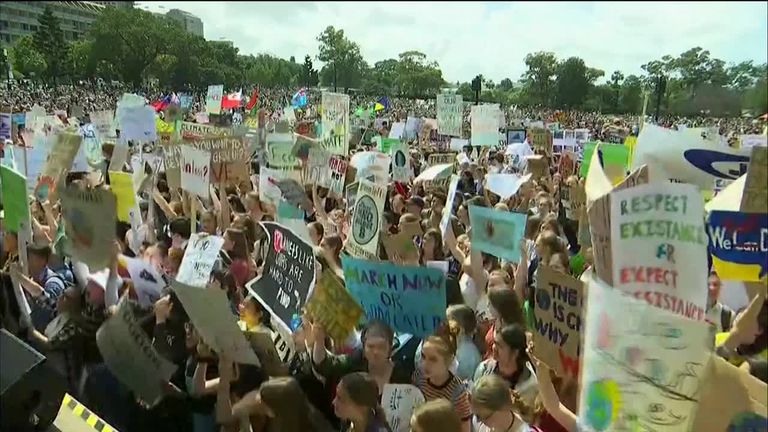'We are now in a climate emergency': Choked by air pollution in Malaysia
Earlier this week, Kuala Lumpur had the most polluted air on the planet when levels plunged to "very unhealthy".
Friday 20 September 2019 10:50, UK
Kuala Lumpur is choking.
The city's normally sparkling twin Petronas Towers now are smudged outlines, faint behind a thick layer of smog.
As we flew into the Malaysian capital the haze was so dense that we couldn't see the ground below until we were almost on the tarmac.
It isn't the only casualty.
Fires on neighbouring Indonesia have shrouded parts of Borneo, Sumatra, the Malay peninsula and Singapore in blankets of smoke.
Those with homes closest to the blazes are having to breathe air which is officially classed as hazardous.
Earlier this week, Kuala Lumpur had the most polluted air on the planet when levels plunged to "very unhealthy", only to be over taken by fellow Malaysian city, Kuching, which is badly suffering.
Palangkaraya, the capital of Borneo's Central Kalimantan province, earlier this month hit 500 or "dangerous" on the Pollutant Standards Index (PSI), according to data from the Indonesian government.
The toxic haze has forced flights to be cancelled and thousands of schools to close over fears for the health of more than a million children.
In central Kuala Lumpur, Chan Li Jin was with volunteers from humanitarian group Mercy Malaysia handing out facemasks to commuters. In just four days they've already given away 20,000.
"It makes me very depressed because you look out of the window and the scenery that you're normally use to you don't see anymore. Buildings, hills - they've just disappeared under the haze and it makes you feel worried because you don't know how it's affecting your health," Chan Li Jin said.
Fires and smog are an annual problem during the summer when slash and burn techniques are used on plantations in Indonesia to clear land.
Scientists claim exposure to smoke could lead to 36,000 premature deaths per year in Indonesia, Malaysia and Singapore if the current trend continues.
Tiny particles in the smog have been linked to breathing problems, strokes and cardiovascular disease.
Dr Helmy Haja Mydin, a respiratory specialist at Kuala Lumpur Pantai Hospital, explained: "I've had patients that have had no issues prior to this and who have come in with all kinds of symptoms so folks with rhinitis, those who are coughing or having phlegm and they end up having a bit of bronchitis so it's affected a lot of people across the age groups."
This week Indonesia brought in more than 5,000 extra troops to try to tackle hotspots while police have arrested 230 people suspected of starting fires.
Both countries have been cloud seeding to try to trigger rain.
Nearly 40,000 fires were detected from the start of the year to 16 September, according to NASA fire data.
The concern is that drier weather means the blazes will continue into October, causing further damage.
Greenpeace Malaysia campaigner Heng Kiah Chun told Sky News this was a wake-up call for the planet.
"We are now in a climate emergency, all the countries and governments and corporations around the world should stop pointing fingers and work together to solve this problem."





